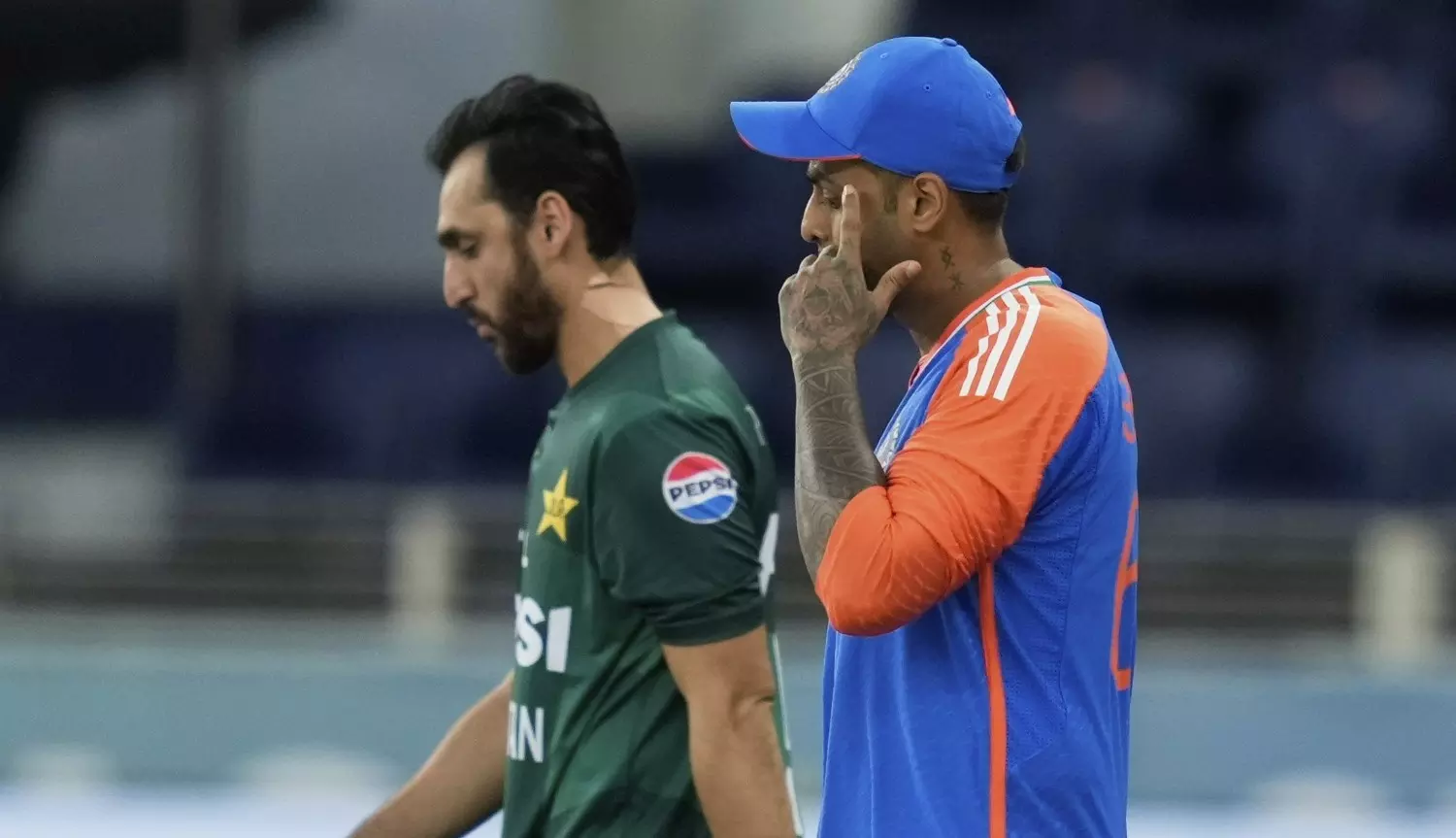
- Home
- India
- World
- Premium
- THE FEDERAL SPECIAL
- Analysis
- States
- Perspective
- Videos
- Sports
- Education
- Entertainment
- Elections
- Features
- Health
- Business
- Series
- In memoriam: Sheikh Mujibur Rahman
- Bishnoi's Men
- NEET TANGLE
- Economy Series
- Earth Day
- Kashmir’s Frozen Turbulence
- India@75
- The legend of Ramjanmabhoomi
- Liberalisation@30
- How to tame a dragon
- Celebrating biodiversity
- Farm Matters
- 50 days of solitude
- Bringing Migrants Home
- Budget 2020
- Jharkhand Votes
- The Federal Investigates
- The Federal Impact
- Vanishing Sand
- Gandhi @ 150
- Andhra Today
- Field report
- Operation Gulmarg
- Pandemic @1 Mn in India
- The Federal Year-End
- The Zero Year
- Science
- Brand studio
- Newsletter
- Elections 2024
- Events
- Home
- IndiaIndia
- World
- Analysis
- StatesStates
- PerspectivePerspective
- VideosVideos
- Sports
- Education
- Entertainment
- ElectionsElections
- Features
- Health
- BusinessBusiness
- Premium
- Loading...
Premium - Events

India's captain Suryakumar Yadav, right, and Pakistan's captain Salman Agha walk onto the field before the start of the Asia Cup cricket match between India and Pakistan at Dubai International Cricket Stadium in Dubai, United Arab Emirates, Sunday, September 14. AP/PTI
It is one thing not to play against Pakistan/Pakistanis, it is quite another to violate basic decency if, for some reason, India and Pakistan do play against one another – as they did in Dubai. Shaking hands with your rival is a standard practice in sports. One sees this in practically every discipline.
Many years ago, I struggled to convey in English to two women at a Hong Kong bank that I needed to convert 900 HK dollars into Indian currency, but they would speak no language other than Mandarin/Cantonese. That is when the bank’s security guard, visibly South Asian, came to my unexpected rescue.
“Kya problem hai, Saab? (What is the problem, Sir?),” the man, dressed in a blue shirt and dark trousers, asked in a reassuring way. Hugely relieved, I explained my predicament. I was leaving for India the next day. I wanted Indian rupees in place of the Hong Kong currency I still held.
Also read: India thrashes Pakistan but unshaken hand echoes loudest
“Let me help you”, said the man and walked into the bank with my HK dollars. In less than five minutes, he was back with a wad of Indian rupees. I thanked him profusely.
Realising I was from India, the man said he was from Karachi, Pakistan, and had been working in Hong Kong for long years. “If you have any other problem, please let me know,” he said, speaking in Hindustani.
We shook hands warmly before I made my way to my hotel.
No handshake between India, Pakistan cricketers
After reading how the Indian cricket captain, Suryakumar Yadav, did not shake hands with his Pakistani counterpart at the Asia Cup clash in Dubai over ‘Operation Sindoor’, I wondered if I had blundered by shaking hands with the Pakistani in Hong Kong. Not only the skipper but the entire Indian team refused to shake hands with Pakistani players.
Also read: India vs Pakistan: Why no handshakes? Suryakumar Yadav explains
After all, India and Pakistan had fought a terrible war when I was in school in 1971 and the Pakistani State has repeatedly unleashed terror attacks in India in the 1980s and beyond.
Maybe I should have taken help from the guard and got my money changed but then walked away in a huff, making it clear that my patriotism cannot permit any bonhomie with a Pakistani.
Of course, the thought never entered my mind.
The tragedy is that what Suryakumar did was terribly wrong – morally, culturally and, certainly, from the sporting point of view.
Even Indian and Pakistan border guards who fight each other do not lose basic decency and exchange sweets on important festivals on either side.
The captain may not realise it, but his unsportsmanlike conduct did not in any way raise India’s stature or that of the cricket team.
Also read: India rout Pakistan in Asia Cup; no handshakes after match
For sure, India has pursued a policy of avoiding all bilateral sporting contacts with Pakistan, accusing the latter of sponsoring terrorism against it for decades. However, having decided to participate in the Asia Cup and also play Pakistan, one is expected to do so in full sportsman spirit.
Standard practice in sports
Irrespective of whether one agrees with it or not, to sever all sporting links with Pakistan is a government decision. Whether such one-sided boycotts put pressure on Pakistan is open to debate.
It is one thing not to play against Pakistan/Pakistanis, it is quite another to violate basic decency if, for some reason, India and Pakistan do play against one another – as they did in Dubai.
Shaking hands with your rival is a standard practice in sports. One sees this in practically every discipline.
Also read: Amid handshake row, Raina claims Indian cricketers didn't want to play Asia Cup
Even Indian and Pakistan border guards who fight each other do not lose basic decency and exchange sweets on important festivals on either side.
It is no doubt mystifying why the Indian government chose to take a U-turn on its own policy of avoiding Pakistan.
What is more saddening is the Indian captain’s decision to sail with a curious and widely panned political decision: We will play against Pakistan but we will not shake hands!
People of Pakistan are friendly and hospitable
Indians must stop demonising Pakistanis as a people. We must realise that Pakistan’s deep state does not take permission from ordinary Pakistanis, its cricketers included, before ordering terrorist acts against India.
Any number of Indians who have visited Pakistan at varying periods of time have come back with the distinct impression that Pakistanis are a friendly and hospitable people who admire India for its many successes.
Only rabble rousers in both India and Pakistan feel the “other” is evil. This suits them. The more Indians and Pakistan stay away from each other, the more their societies can be easily demonised.
Indeed, many of the Pakistanis, when they talk in confidence, reveal what exactly they feel about their own politicians and the intelligence-military apparatus which effectively controls Islamabad.
Rita (name changed), a young girl from a Delhi school, was pleasantly shocked when she was offered huge discounts by every trader at Lahore’s Anarkali Bazar the moment she revealed she was an Indian. This happened when a group of Indian schoolchildren visited Pakistan in response to a similar trip by Pakistani students.
Of course, there are other Pakistanis who love to hate India – for more reasons than one. Such Pakistanis have either close ties with the military establishment or the numerous Islamist outfits that abound in that country.
Only rabble rousers in both India and Pakistan feel the “other” is evil. This suits them. The more Indians and Pakistan stay away from each other, the more their societies can be easily demonised.
What if this argument of keeping away from Pakistanis is made mandatory for all Indians?
Will Indian employees then boycott their Pakistani colleagues in workplaces in the Gulf and the Western world?
No boycott of Chinese players
So that we don’t get “polluted” by anything Pakistan, will Indians have to stop visiting Pakistani restaurants abroad? And perhaps prevent Pakistanis from eating at Indian restaurants or staying in Indian hotels and motels?
If Rama could be so generous even to the one who abducted his wife and kept her a prisoner, surely the Indian captain would have enhanced his and the country’s stature by shaking hands.
Surprisingly, no such boycott of Chinese players and others has ever been suggested though Beijing has seized large swathes of Indian territory and openly backed Pakistan during Operation Sindoor. Is it because China is not a Muslim country?
What we can learn from Lord Rama
I recall the finale of the Ramayana in this context.
When Ravana lay dying, Lord Rama asked his brother Lakshmana to go to the Lanka king and seek his blessings and learn from him. Rama called Ravana a great Shiv devotee and an authority on raj dharma shastra notwithstanding the wrongs he had done.
When Lakshmana returned to tell Rama that Ravana did not bless him although he did what he was told, Rama shot back: Did you stand near his head or legs?
The head, replied Lakshmana. Rama sent him back to Ravana saying one must stand near the legs to be blessed. One cannot be humble and haughty in the same breath.
If Rama could be so generous even to the one who abducted his wife and kept her a prisoner, surely the Indian captain would have enhanced his and the country’s stature by shaking hands. Playing against Pakistan and then acting cold against the sporting opponent is poor politics, pure and simple.
(The Federal seeks to present views and opinions from all sides of the spectrum. The information, ideas or opinions in the articles are of the author and do not necessarily reflect the views of The Federal.)


